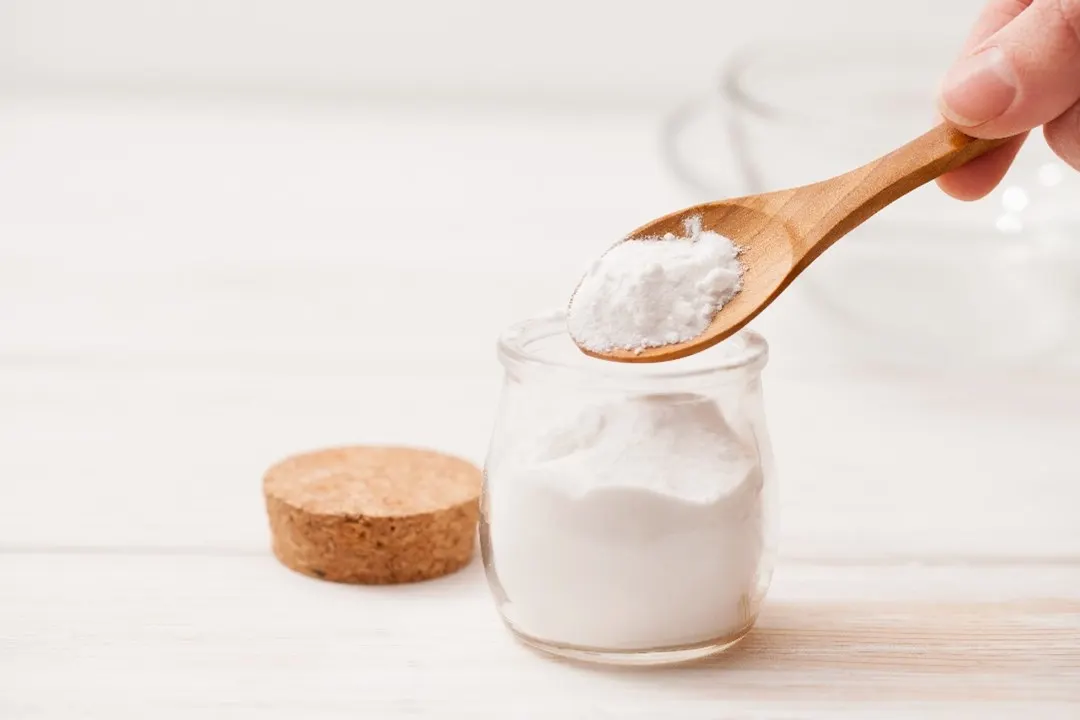IS BAKING SODA HELPFUL IN GETTING RID OF DANDRUFF

Many people have tried to get rid of dandruff using baking powder – but does it really work?
As the name suggests, baking powder or baking soda are ingredients that are used extensively in baking. It is usually found in your kitchen cabinet and is used because of its ability to make the dough rise.
Baking soda has additional uses which makes it a versatile product:
- It finds a way into dental care as an ingredient in mouthwash and toothpaste.
- It can be used to treat sunburnt skin.
- For odour control in air fresheners and deodorants.
- As a cleaning agent used in the kitchen, bathroom, and laundry.
- To clean pesticides and germs from your vegetables and fruits.
But the question here is whether you can use baking soda for dandruff or baking powder for dandruff. And that is when the information gets a bit tricky.
What is hair dandruff?
First we need to learn what is the cause of dandruff. It is a skin infection produced by a naturally occurring fungus known as Malassezia Globosa. This particular fungus feeds on the sebum or oil that is secreted by your scalp. It breaks down the oil into by-products, that 1 in 2 people across the world is sensitive towards. If for some reason the scalp produces excess oil, this fungus grows beyond control and triggers your body into a reaction. It leads to severe scalp itching, red scaly skin, and dead skin cells in the form of white flakes.
Can baking soda get rid of dandruff?
The idea behind using baking powder as a home remedy for dandruff is that it works as an exfoliant, helping to clarify the scalp. Many people claim that the application of baking soda for dandruff is the best available solution. But these claims are anecdotal and should be taken with a pinch of salt.
To understand the effectiveness of baking soda, we must understand the benefits of using it:
- Baking soda has been used in medicated baths for centuries, as a treatment for psoriasis and skin infections. Studies tell us that using baking soda can significantly decrease skin irritation and itching.
- Fungal agents that cause superficial infections are affected by baking soda. Studies have shown a complete or partial reduction in fungal growth due to the use of baking soda. This shows the anti-fungal properties that it potentially contains.
- It can absorb oil and grime that is present on your skin or scalp, washing it away under water. Therefore it’s used as an exfoliant or can be used as a dry shampoo for oily hair.
These points allow us to consider the use of baking soda for dandruff or baking powder for dandruff. Applying baking soda onto your scalp can potentially get rid of the oil and germs that cause your dandruff. But there is no proof to back this up. Even the studies mentioned above were never conducted for dandruff. If you decide to use baking soda, tread carefully.
How to use baking soda?
Baking soda is a highly alkaline substance, and most people combine it with an acidic ingredient to not affect the pH balance of your scalp. Create a hair/scalp mask from the ingredient of your choice and apply it for a while, before washing it off thoroughly.
- Apple cider vinegar – This combination contains anti-microbial properties that can reduce inflammation and clear sebum build-up on your scalp.
- Lemon juice – Packed with vitamin C and anti-inflammatory properties, this combination can reduce your itching and clear any scalp accumulation.
- Water – The most commonly applied, water acts as a carrier for the baking soda. This is based on the concept that baking soda will lift all the oil and dirt from your scalp.
- Olive oil or coconut oil – Using baking soda with either of these oils can allow for a reduction in itching and skin irritation, while giving you shiny hair.
- Tea tree oil – It contains anti-fungal properties that has shown to significantly reduce inflammation. This combination should remove any build-up, but tea tree oil must be dealt with carefully as it can cause a lot of harm.
Any side-effects of using baking soda for hair dandruff?
The irony of baking soda or baking powder for dandruff, is that there are various studies that show the negative impact on your scalp and hair. Most studies do not recommend the excessive use of baking soda on your head.
The pH level of your scalp is generally acidic, while baking soda is alkaline. The pH levels of your hair are even more acidic. Excessive use of baking soda can make your scalp and hair alkaline in nature, which can cause a whole lot of trouble:
- Frizzy, weak and damaged hair.
- Loss of moisture that leads to dry and sensitive skin.
- Stripping off your natural oils and drying out your skin, that triggers your body to produce more oil and aggravate your dandruff.
- Damage to the hair cuticle and hair follicle.
- Inflammation on your scalp.
Overall, dandruff and baking soda do not seem like a great match. Even though it might help you temporarily, the problems that come with regular use make this a bad idea.
If you’re really concerned about build-up, you should use a clarifying scalp shampoo once in a while. These are heavy shampoos that can reset the health of your scalp and hair, by removing all forms of oil, dirt, and products. Use this sparingly as it can also dry out your head.
But to truly get rid of dandruff, you need a good anti-dandruff shampoo like the Head and Shoulders Neem or Cool Menthol, that can calm the itching sensation and get rid of the dandruff causing germs. You also have products that combine the benefits of shampoos and conditioners like the Head and Shoulders 2 in 1 Active Protect. There are various products that are available over the counter which work better than any dandruff home remedy. Baking soda for dandruff might sound like a cool idea, but you’re better off without it.



